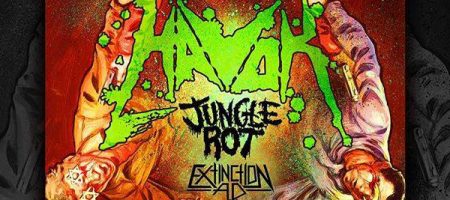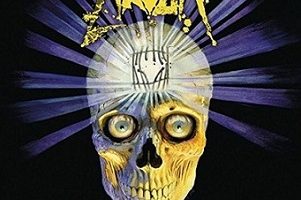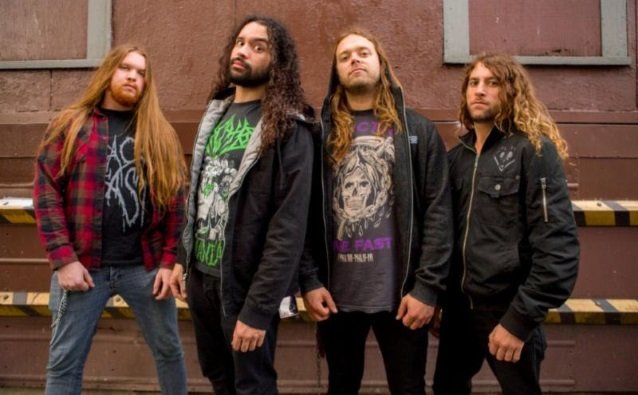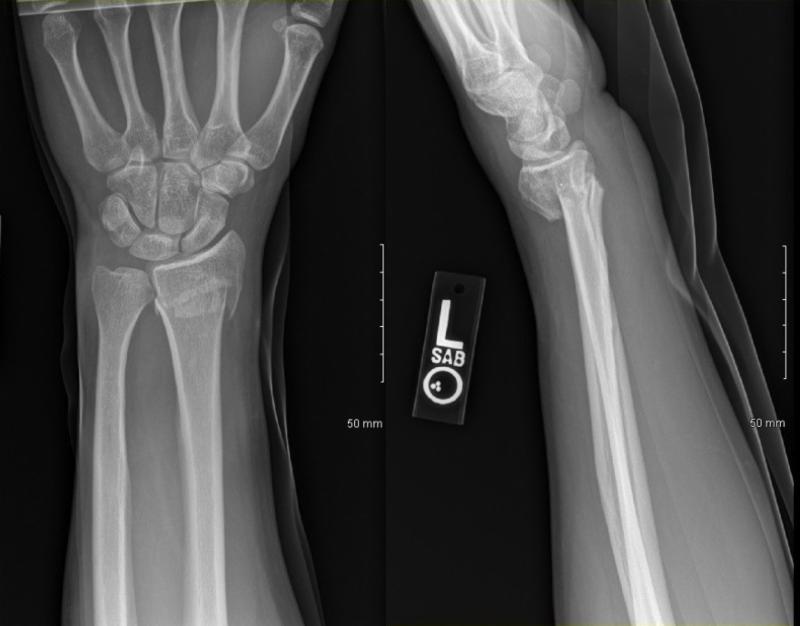Havok – Critical Independence
Wednesday, 20th May 2020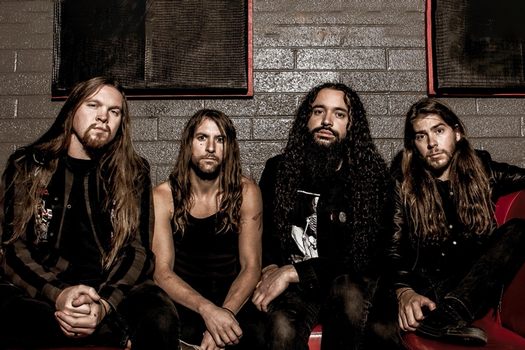
Denver, Colorado is home to thrash quartet Havok – a potent force that has through their discography proven that the old guard can’t rest on their laurels when it comes to studio records or live work. Electrifying performances and killer musicianship all packaged together in songs that come alive from albums like Time Is Up and Conformicide to stages worldwide. Their latest album V steps up the songwriting and performances another notch – diversity and execution that pushes the envelope of what these musicians can do on all fronts, lyrically, vocally and musically.
Deliberate and thoughtful with his answers, we reached out to guitarist/vocalist David Sanchez as he brings us up to speed on the latest bass player change, the game plan behind V, thoughts on how the career has unfolded and where they stand as a unit, and lots of deep thoughts regarding education, the media, and how the entertainment industry may be the last to survive the effects of this pandemic.
Dead Rhetoric: You secured a new bassist in Brandon Bruce – another fantastic player in a series of musicians you’ve had in that spot over the years. Why do you think it has been a bit of a challenge nailing down the bass spot for Havok?
David Sanchez: We were buddies with Brandon. We met him many years ago when we were on tour. He has hopped in the bus with us and rolled around to cities. He had actually gone on the road with us before he was in the band. When he caught wind that we needed a bass player, he immediately offered himself up for the position. I sent him over some videos and let him know these are the bass lines- actually I asked him to send me over videos of him playing bass tracks to these songs. He did that and he was nailing all the stuff. We already know this guy, he wants the position, and he can play the stuff – let’s do it.
As far as what makes it tough to hold onto a bass player. I don’t know. Being in a band is extremely difficult. It’s like being married to three other guys that I also have to work with. Being in a touring band is a very particular situation. It’s like being married to Siamese twins that you also work with.
Dead Rhetoric: That’s right – because between Reece, Pete, and yourself you’ve been fairly stable since the beginning of 2010, it’s just like the bass players are the tougher fourth spot for you guys to nail down. But you’ve had some killer players through the years…
Sanchez: For sure. Everyone who has been in the bass position has been pretty killer at the job. But we can’t seem to hold onto one for longer than three or four years. (laughs)
Dead Rhetoric: V is the fifth full-length, another versatile effort that showcases all facets of what Havok can deliver in the thrash genre. Tell us about the songwriting and recording process for this one, and how you think this effort stands up against your previous discography?
Sanchez: I think this record is more diverse than our other albums, and on this record, we made it a big point to not have all the three stringed instruments all playing the same stuff together. We wanted to utilize the fact that we have those three instruments and allow them to play unique stuff to allow us to create a dense musical fabric. That was a big focus during the writing, and it allows a lot more replay value to the songs and makes for a more interesting listen. If you listen to the song one time, you might not catch everything that’s going on, you have drums and three different stringed instruments and vocals, five chunks of music being played together.
Kind of like when you listen to…obviously I’m not comparing ourselves to this, but the density of the music to classical music. Things like Mozart, Beethoven, when you’ve got so many different lines going on at the same time and you don’t catch it all in the first listen. In that part I think it’s similar to classical music.
Dead Rhetoric: Where did you want to come across lyrically for this album- as the closing epic “Don’t Do It” touches on suicide, was that inspired by any particular event that occurred in your lives? And how do you feel mental health is handled in the medical field, as many believe there is a stigma attached to seeking out help and receiving proper insurance support for this?
Sanchez: Yeah, it’s really mind-blowing that mental health is looking at in a negative way. The people that need help like you said are stigmatized, instead of looking at them as people that need help so let’s help them. People get made fun of and called names, it’s a taboo thing to talk about. It’s unfortunate because it’s incredibly prevalent in our country and a lot of other countries. A lot of countries that seem to have their shit together on the surface and seem well off as countries that mental health is a big problem in places like that.
That song “Don’t Do It” was inspired by a statistic that I saw, a really shocking thing. In the last decade, the number of young people committing suicide has tripled. Today there’s three times as many kids killing themselves as when I was a kid. And that blew my mind, and I wanted to say something about it. The song is called “Don’t Do It”, and I hope that somebody who is feeling depressed or struggling with mental health will listen to that song and become inspired by the song not to do it. I’ve been in bad places mentally before, and I’m really glad to be able to tell the tale. I’m super glad I didn’t do it, life can get way better. Maybe someone else just needs to hear that.
There are some songs that won’t surprise people about anti-political activism. But there are also songs about the psychedelic experience on this record. That’s nothing that we’ve ever really touched before.
Dead Rhetoric: In assessing the career arc of Havok to date, what do you think are some specific milestones that happened either in terms of specific lineups, albums, tours, festivals, where you knew you were moving up the ranks and sustaining a foothold with your music?
Sanchez: Well, when you go back to some of these same festivals, we literally notice that we are moving up the ranks on the poster (laughs). I think that’s a pretty telling sign. But specifics of things that we’ve done that were an obvious metric, of hey we are doing stuff right. Getting to play the festivals in Europe for the first time was a pretty big step in the right direction. When we returned to some of those same festivals and then being higher up on the bill, that was confirmation that we are doing something correct because we are not going down, or staying in the same position, we are building up.
Also I think the numbers don’t lie – our Spotify, our YouTube, all those numbers have increased significantly over the last few years. They’ve gotten way, way bigger. People must be finding out about our band, showing their friends, and listening way more than they ever have in the past.
Dead Rhetoric: Of the second wave of thrash bands inspired by the older 80’s acts, I would say yourselves and Warbringer are probably the groups given the most regard for consistency and longevity in your activities. Do you believe you’ve gotten the respect and admiration you deserve from not just the fans, but also your peers at this point – and what will it take to move Havok up the ranks into bigger tours and higher billing on festivals?
Sanchez: Well, I think getting the respect of peers is always a very cool thing- but it’s not necessarily the goal. We write and play this music that we make to satisfy ourselves. We are not writing it for other people, or our peers to look at us and say, ‘wow- that’s really good!’. We are writing it to satisfy ourselves artistically – we can’t write for other people because it’s a losing game, you can’t make everybody happy. If that’s the goal, you are going to make everyone terribly disappointed.
It’s really just for us, and when we get the respect from peers, that’s just the icing on the cake.
Dead Rhetoric: Considering you’ve always been road warriors throughout your career – have you seen the major differences in support of your music across all parts of the globe, and what are some territories that you want to explore that you haven’t been able to get to as of yet?
Sanchez: There are parts of the world that react to our music very differently. There’s no doubt about that. My favorite place to go, although the travelling is more brutal than usual, the energy of the shows in South America and Latin/Central America. They love metal down there, and they go absolutely nuts at shows. For places I want to go and I’ve never been, number one for me would be Africa. We’ve played on every other continent, but I don’t count Antarctica, as only one band has ever played there (laughs). And it doesn’t sound like a good idea, unless you are that one band… that being Metallica. Africa is a big undiscovered market. I want to play in Kenya, South Africa, and Morocco as well.
Dead Rhetoric: What are some common mistakes or misconceptions you believe younger musicians have in the metal genre that you wish they would think about, or possibly steer them clear of to consider?
Sanchez: Definitely don’t expect things to always go your way! (laughs) I remember when I was a teenager I met Frank Bello once out at NAMM in California. I’ll never forget, Frank said to me ‘this industry is built on lies’. Don’t trust anybody. I’ve come to learn all these years later, he was totally telling me the truth. The entire industry is based on lies, that could be looked at in so many different aspects of it to ring true.
For people getting into it, if you don’t want to have your heart broken keep your expectations very low. Don’t expect anything – and when you do get good things, cherish them. Don’t expect it should have happened – you can argue a lot about things that should happen, but they don’t. In this industry there is a lot of politics, there is a lot of back scratching, deceit, and a lot of luck involved. William Shakespeare once said expectation is the root of all heartache, and I think he was totally right. I think that same logic applies to all of life. If you keep your expectations low, you will never be disappointed.
Dead Rhetoric: It seems like the Colorado metal scene is gaining a lot of international attention for its bands and different styles. Are you surprised that it’s finally getting the proper attention and respect it deserves?
Sanchez: Denver has always had a really good metal scene. I know that any time we’ve toured with other bands and Colorado is on the routing, bands are really stoked to play Denver as it’s pretty much always a good show. People go out to shows, come out and support, and they have pretty much since I was a kid. I feel like we’ve always had a strong metal scene, but maybe not a ton of bands from Denver that have broken out and toured a lot to make a name for themselves out of Colorado. Maybe in the past that didn’t happen as frequently as it does today.
Dead Rhetoric: What worries you most about the world that we live in today? What do you think the average person needs to think about, consider, and take action on to make the world a better place for the future?
Sanchez: Holy shit – that’s a really loaded question! But…obviously there’s a lot of things to unpack with that question. The number one thing that could change our future for the better is to have people snap out of their television stupor and think critically. Get news from all sorts of different places and read between the lines. Do independent research – because what they are telling you on television, CNN, Fox News, NBC, ABC – there’s only half a dozen companies that exist that own 95% of the media that we are exposed to. That’s not very many different opinions, being shoved down our throats. Independent research and independent thought (are) absolutely critical if we want the world to be a brighter and better place, instead of a darker and more Orwellian hellhole.
Dead Rhetoric: I definitely agree. I think many in the younger generation aren’t exposed to using critical thinking and opinions are just shoved down their throats without doing the proper research and due diligence…
Sanchez: That’s correct. Schools are a brainwashing mechanism, and the Department of Education didn’t even exist until 1979 – and America was just fine before that. Ever since then, it’s very clear the dumbing down of the American populace has been in effect. There are a lot of things they don’t teach you in school that are good informationally for people to know. A lot of things that school will not talk about that are vital for your success in life, as an adult and there’s a lot of information they don’t tell you about that would spark creativity, open people’s minds and possibly make more geniuses in the world. If they did, we might live in a world where there’s a million Elon Musk’s in America – but that’s not really good for the system.
Dead Rhetoric: How would you describe the band chemistry within Havok – at this point are you able to balance the music and business functions adequately while also giving each other the necessary space to grow and learn from each other?
Sanchez: Yes. Juggling the business and artistic side of things is not my favorite part of being in a band (laughs). It’s definitely leaves something to be desired. Doing that juggling act has been something I’ve been doing for fifteen years or so. It’s a fact of life at this point. Balancing business and art and trying to give each other space, I think we’ve figured all that stuff out. Things operate fairly smoothly. For now, the space thing is not an issue- because I don’t know if the four of us are going to be in a room together anytime soon. There’s talks that we may be able to go on tour this year later in the fall, but it’s anybody’s guess at this point. Things are evolving so quickly, who knows what’s going to happen.
Dead Rhetoric: Where do you see the state of thrash and heavy metal currently? What pleases you most, and what improvements need to be made for the longevity of the movement?
Sanchez: Thrash and metal are doing well at the moment. For the genres to continue to thrive, people need to just write good material. I don’t think we need to reinvent the wheel and keep coming up with new subgenres of metal. There’s already so much diversity and variety in the metal world. There are a lot of things that fall under the umbrella of metal, and things that sound wildly different from each other. Blind Guardian does not sound like Animals As Leaders. Limp Bizkit does not sound like Deicide – but they all fall under the metal umbrella. I don’t think bands necessarily need to be way more inventive or creative to redefine the genre. I would prefer to see bands just write good material. So much has already been done, it’s hard to tread new paths in the genre field.
What’s really going to allow the genre to thrive is write cool riffs, write great drum parts, write great bass lines, write great lyrics and execute the parts well. That’s what people want to hear. If everyone was constantly in search of something different and cutting edge and a new flavor, I don’t know what kind of world we would be in. I think the quality of the content is more important than trying to be bizarre. I’d much rather listen to a band that has simple music and the song is really good than listen to a complete shred-fest where there is no songwriting on display – technical for the sake of being technical, no emotion about it.
Dead Rhetoric: How are you spending the downtime due to the pandemic – have you picked up any new habits, hobbies, interests? And how do you think humanity and the economy will recover from this?
Sanchez: I haven’t had any downtime. I’ve been working on new Havok music videos, and mixing other bands recordings. I do mixing and mastering, and I’ve been doing that. I look forward to a day when I do. I’m slightly jealous of the people that say they were bored.
What’s it going to take for us to get out of this. I really think the entertainment industry is going to be the last to recover from this whole thing. Entertainment is a luxury item, it’s going to be really hard to convince people to spend their money on buying a concert ticket and a t-shirt when they are having a hard time getting food on the table and paying rent. I think entertainment will be the absolute last thing to bounce back from this whole thing. I’m an artist and spend a lot of time and money going out and playing concerts entertaining people. It’s unfortunate, but it goes way beyond me. Comedians, visual artists, movie makers, musicians, actors, even sports – there are so many different entertainment avenues that have been affected by this, people don’t realize how big and broad that scope of people are.












